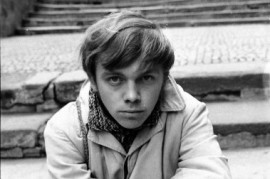What was so attractive to the "little singer with the big voice" that more than twenty years after his death, people still sing his songs and read his poetry? What is the place of the artist in the tragic history of his homeland? An individual can influence the course of history? What is the impact on the psyche makers have his traumatic childhood experiences? Kryl was the victim of history of his people? Crowds loved him, but died abandoned and bitter - because they never compromised. These and other questions were posed by the filmmaker Krystyna Krauze.
The feature-length documentary about an important figure in Czech bard on the background of European history in the 20th century, the Czech-Polish co-production. Apart from Czech friends and relatives (Jan Kryl, Miroslav Kovarik, Jaroslav Hutka, Vladimír Merta, Jiří Černý, Karel pithy, Friedrich Taussig and others) tell about their meetings with the Poles also covers: Agnieszka Holland, Andrzej Zajączkowski ,, Alfred Znamierowski, songwriter Antonina Krzysztoń and singers Jacek Kleyff and Michał Tarkowski.
The film is a parallel biography of Karel Kryl and director, who was born in Gdansk, Poland, in the district Oliva. Now Gdansk later became the cradle of Solidarity and song Krylova In the name of humanity (in the Polish version of Organa w Oliwie) was the first artistic reflection of the events of December 1970, which became a harbinger of formation of the Polish revolutionary movement and the subsequent collapse of communism.
The director is also the narrator of the document; her life's destiny is closely linked to the formation and personal contacts with Karel Kryl. This film was "paying off" the debt. It is also a parallel story of the fate of our neighboring countries, Kryl relation to Poland and the Poles. Karel Kryl sang many of her songs in Polish: in 2014 in Bohemia LP record Solidarity - concert footage in Germany, which gave Kryl Polish exiles who find themselves in the West after the imposition of martial law in December 1981. His fortunes were connected with the Poles from early youth and cooperation with radio Free Europe that friendship deepened.
In the 80s of the 20th century was Kryl in Poland very popular because of samizdat tape singer Antonina Krzysztoń. Its foiled repatriation started meeting with the exiled citizens of Czechoslovakia in Wroclaw, Poland two weeks before the Velvet Revolution.
Karel Kryl
(12. 4. 1944 - 3. 3. 1994)
His songs always provoked and still leave no listener indifferent. Some take it as a classic legend protest their time for others was just eternally disgruntled complainers. Kryl's songs, which you yourself wrote the music and lyrics, his urgent appeal dismissal as strongly today as at the time of his famous song generational Brother, Close the door became a symbol of resistance against the August invasion of Czechoslovakia and the then undemocratic regime. As one of the first republic to his back and tried to help change the situation in Czechoslovakia. Disappointed developments in the country eventually die prematurely March 3, 1994, a few weeks before his fiftieth birthday.
Source: tz

 "Brother Charlie" shows the tragic fate of two legends of Czechoslovak revolution - in 1968 and 1989. This documentary lot of unknown events from the life of Karel Kryl and present interesting archives, which are not yet publicly known. Lyrics of his songs are still relevant - he was a visionary, foresaw the future, but also perfectly reflect present. Eternal rebel ...
"Brother Charlie" shows the tragic fate of two legends of Czechoslovak revolution - in 1968 and 1989. This documentary lot of unknown events from the life of Karel Kryl and present interesting archives, which are not yet publicly known. Lyrics of his songs are still relevant - he was a visionary, foresaw the future, but also perfectly reflect present. Eternal rebel ...